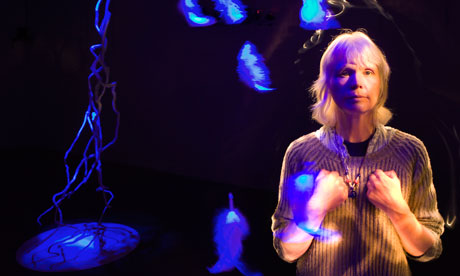
Up to 1,000 artists, musicians and writers are to be offered government-funded residencies on remote Scottish islands, at art centres and Highland retreats in a new programme to fund new work.
The Guardian has learned that government arts agency Creative Scotland will this month unveil what it calls Europe's most ambitious artists' residencies initiative, one of several new funding plans supported by Edinburgh ministers.
The Creative Futures programme will support about 200 painters, dancers, poets, film-makers and visual artists each year over the next three to five years. They will be funded to work alone or as part of public arts projects in Scotland, elsewhere in the UK, or overseas. Arts executives hope the £1m-a-year initiative will find future winners of the Turner prize such as previous Scottish recipients Susan Philipsz and Douglas Gordon, and fund new writing and feature-length films.
Senior arts figures said the project highlighted a deep gap between the levels of funding and political support for the arts in England and Scotland.
Coalition ministers have caused consternation in the English arts world by cutting funding to Arts Council England by nearly 30% over the next four years, after the Department of Culture, Media and Sport's budget was cut by £300m.
Some cash-strapped English councils have slashed or entirely stopped their arts funding. By contrast, Creative Scotland – formed after last year's merger of the Scottish Arts Council and ScottishScreen – has the same budget in cash terms of £35.5m as last year, and also has a separate £10m music education programme.
Although the overall Scottish culture budget will fall next year by 6.7%, Fiona Hyslop, the arts minister, has kept £2m for promoting Scottish arts and theatre in the Edinburgh festivals for another year.
Andrew Dixon, Creative Scotland's chief executive, said there was cross-party support for the arts. He is able to fund more than 50 major arts events and companies, including the Edinburgh international festival, at the same level this year.
"Scotland is a small country, and there's a kind of pride in politicians, both at a local and national level, in what's being achieved here," he said. "They don't feel that in quite the same way in England. I think that's a real strength of the size of Scotland – a 30% cut doesn't half curtail your opportunities to plan long term."
Sandy Maberley, director of the Somerset-based theatre company Theatre Melange, said artists in her area "will all be emigrating" to Scotland after the county council and two district councils entirely cut arts funding.
Maberley said it was important for arts organisations to avoid "playing the victim in this situation" but said the damage from the collapse in England's arts funding could take years to repair.
"Knocking something down is quick, and it's easy. The time to build it back up is incalculable," she said. "The arts are about a creative ecology and that includes economic wealth, social wealth and cultural benefits."
The Creative Futures initiative will be directed mainly at Scottish-based artists and creative workers but the residency programmes will also award places to artists based outside Scotland.Installation artist Gill Russell, whose latest work from a residency at the Sabhal Mor Ostaig Gaelic college on the island of Skye is now being exhibited at the Royal Scottish Academy in Edinburgh, said residencies were essential for artists.
She was given £9,000 by the Scottish Arts Council for a six-month residency at the college, which she extended to 18 months. "I realised there was a huge leap of faith in me and that's extremely rewarding," she said.
"You feel you're very much valued as an artist and that gives you a lot of confidence, instead of having to scramble around and clean loos to get by. Without that you don't have the energy, because it takes so much energy to produce good art."
She added: "The situation in England just makes me feel sad."
Ciara Barry, a Glasgow film producer, was given funding for a short film-makers' residency at the Rotterdam film festival and is now making her first feature film with the artist Henry Coombes, who was Scotland's representative at the Venice Biennale.
Her funding for the Rotterdam Lab event was crucial, she said. "I'm working towards my first feature film credit, so for me going to Rotterdam was the first time I was at an international networking event and meeting my peers. You can't make it all on your own, especially in this day and age."

